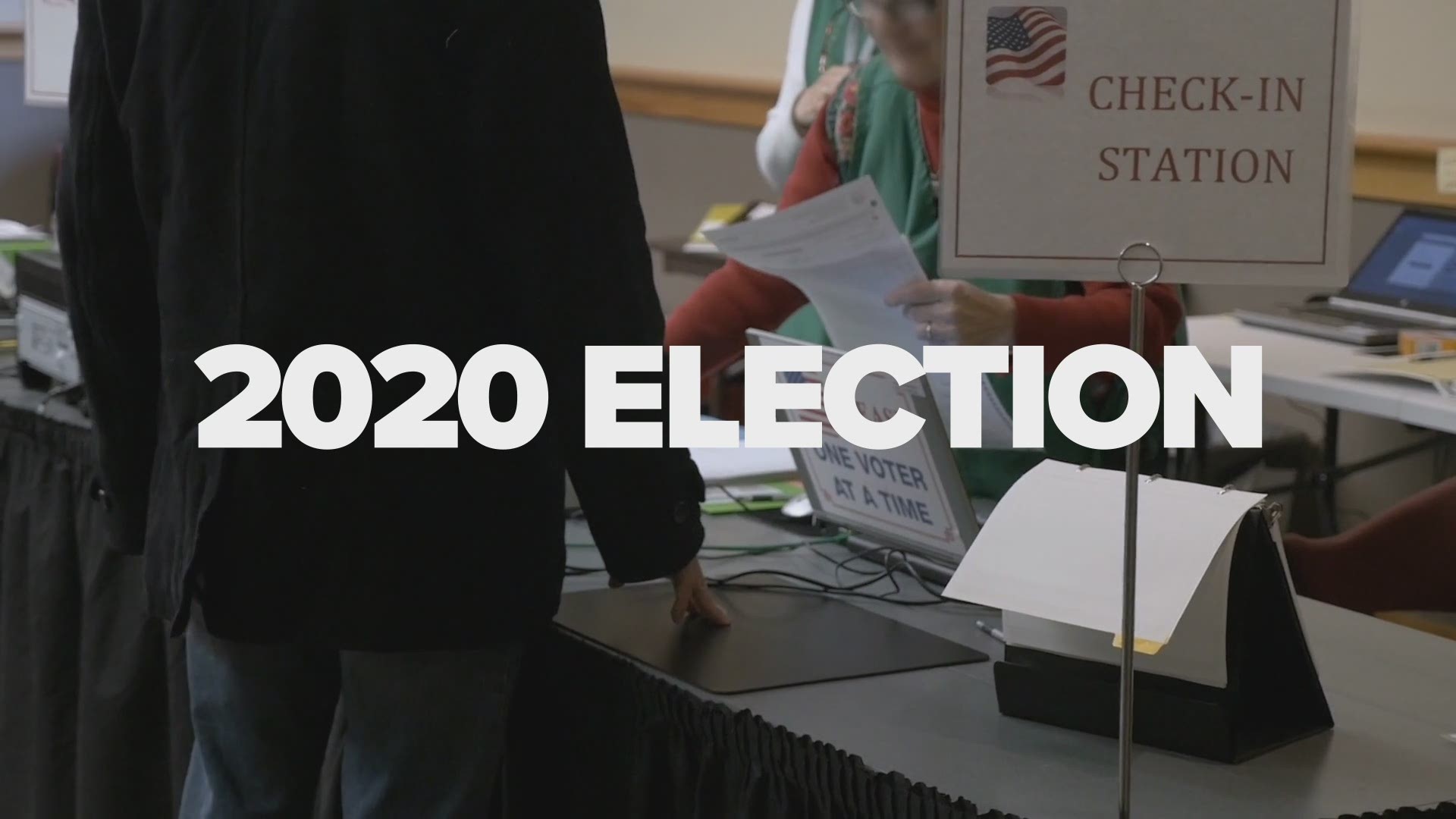WASHINGTON — The eyes of the world are on who will win the presidency after polls close Tuesday, but attention is also being paid to Congressional races, particularly the U.S. Senate.
The House is expected by political forecasters to stay in Democrats' control after all the votes are counted, thanks to their already sizable lead in the chamber. Republicans currently have 198 seats to the Democrats' 232 in the House. For the GOP to take control, it needs a net gain of 20 seats.
The Senate could stay in Republicans' hands, flip to the Democrats or end up in a 50-50 tie -- a scenario that would make the vice president the tie-breaking vote. Democrats have 45 seats in the Senate, but two independent senators caucus with them -- so consider that 47. Republicans have 53. Democrats need a net gain of four seats.
Here is a brief look at 20 seats that appear to be most at risk of changing parties. It is based on a compilation of election forecasts by the Cook Political Report, RealClearPolitics, University of Virginia's Center for Politics, the non-partisan Inside Elections and FiveThirtyEight.com. The methodology is explained at the bottom of this article.
Senate
Alabama
- Sen. Doug Jones (D, incumbent) vs. Tommy Tuberville (R)
Jones won the seat formerly held by Republican Jeff Sessions in a special election two years ago. But it's in deep-red Alabama and Tuberville is expected to win easily.
Arizona
- Sen. Martha McSally (R, incumbent) vs. Mark Kelly (D)
McSally was appointed to this seat in 2019 after losing the race for Arizona's other Senate seat. Four of the five forecasters give Kelly the edge to finish out the late Sen. John McCain's term.
Colorado
- Sen. Cory Gardner (R, incumbent) vs. John Hickenlooper (D)
Hickenlooper is the former Colorado governor and presidential candidate. All five forecasters give him the edge.
Georgia
Both races require 50% of the vote to win, otherwise, the top two finishers head to a Jan. 5 runoff.
- Sen. Kelly Loeffler (R, incumbent) vs. 20 challengers
This is a special election to determine who finishes the term of the retired Sen. Johnny Isakson. While the ratings services are split on whether this seat will end up in Democrat or Republican hands, polls are looking good for Democrat Raphael Warnock to make it to the Jan. 5 runoff. The question is whether he will face Loeffler or another Republican, U.S. Rep. Doug Collins.
- Sen. David Perdue (R, incumbent) vs. Jon Ossoff (D)
Ossoff has steadily crept up on Perdue in the polls in recent weeks in what, normally, is a reliably red state. All five forecasters have this as a toss-up.
Iowa
- Sen. Joni Ernst (R, incumbent) vs. Theresa Greenfield (D)
This is a tight one, with one forecaster giving Ernst the edge while the others rate it a toss-up.
Maine
- Sen. Susan Collins (R, incumbent) vs. Sara Gideon (D)
Democrats targeted this race early and Collins has had a fight on her hands. Three of the forecasters give Gideon the edge while two rate it a toss-up.
North Carolina
- Sen. Thom Tillis (R, incumbent) vs. Cal Cunningham (D)
Three forecasters are giving Cunningham the edge while two rate it a toss-up.
South Carolina
- Sen. Lindsey Graham (R, incumbent) vs. Jaime Harrison (D)
Once seen as a safe seat, Harrison came on strong in the past few months buoyed by record fundraising for a U.S. Senate campaign. Three forecasters have this in Graham's favor while two rate it a toss-up.
House (Incumbent party in parentheses)
Georgia 7th (Republican)
Most of the forecasters have this going the Democrats' way.
Indiana 5th (Republican)
Three have this as a toss-up with two leaning Democrat.
Michigan 3rd (Libertarian)
Former Republican and current Libertarian Justin Amash is not running for re-election, so it is guaranteed to change hands. Amash left the GOP after calling for Trump's impeachment following Special Counsel Robert Mueller's investigation. Three of the forecasters rate this a toss-up while two have it leaning Republican.
Minnesota 7th (Democrat)
Two forecasters give Republicans the edge while one has it as a toss-up.
New Jersey 2nd (Republican)
Incumbent Rep. Jeff Van Drew quit the Democrats and joined the GOP during Trump's impeachment. Two forecasters have this leaning toward Democrats while the others have it as a toss-up.
North Carolina 2nd (Republican)
North Carolina 6th (Republican)
These two districts were re-drawn by court order due to partisan gerrymandering. They are both firmly expected to go to Democrats.
Oklahoma 5th (Democrat)
This was rated a toss-up across the board until Monday when one forecaster moved it toward Democrat.
Pennsylvania 10th (Republican)
This is rated as a toss-up by all five forecasters.
Texas 23rd (Republican)
This is the seat held by retiring Rep. Will Hurd, the only Black Republican in the House. Most of the forecasters give this to the Democrats, with one calling it a toss-up.
Texas 24th (Republican)
Three forecasters are leaning toward Democrats here while two rate it a toss-up.
Methodology: Four of the forecasts used in this article rate each race on a scale ranging from "safe" or "solid" Democrat to "toss up" toss-upe" or "solid" Republican. FiveThirtyEight rates them on level of favorability. Seats currently held by one party, but have multiple forecasters indicating the other party is more likely to win in November, are deemed to be most at risk of switching parties. For example, if a Democrat holds a seat but all the forecasts have it as a toss-up or leaning Republican, that would be a seat in danger of flipping.



